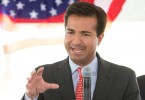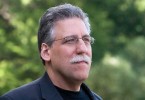Another Democratic debate ends and Martin O’Malley is once again standing alone out in left field. Not literally, of course. But for months now the progressive former Governor of Maryland has been playing the thankless role of largely ignored gooseberry in the middle of the Clinton-Sanders media love-fest. A role that could reach its curtain call next month in Iowa and New Hampshire.
Having just turned 53, O’Malley is by far the youngest of the three Democratic presidential candidates — almost 16 years younger than Hillary Clinton and a little over 21 years younger than Bernie Sanders. He’s clearly more progressive than Sanders on gun control and more progressive than Clinton on the environment, yet he appears not have those demographic voting blocks behind him in any significant numbers.
Equally on LGBT rights, O’Malley has been on board from the start of his political career. He has had no need to evolve. As Mayor of Baltimore, he signed the state of Maryland’s first transgender anti-discrimination bill. As Governor of Maryland, he expanded the state’s longstanding protections against discrimination, so that no one could be fired, denied housing, or denied public or private services for being gay or transgender.
Under the O’Malley administration, Maryland became the first state in the Union, an hour ahead of Maine, to defend and pass marriage equality in a statewide referendum. He was the first presidential candidate to endorse the Equality Act. And O’Malley’s was the only campaign to respond — in the affirmative — to a Boston Herald Radio question about whether the Democratic candidates would consider an openly gay running mate. O’Malley campaign spokesman, Matt Corridoni, told the hosts that “considering someone from the LGBT community is a very easy ask” for the O’Malley campaign. “He has been fighting for inclusion since he was Maryland governor.”
In the televised Democratic candidates debates, O’Malley has dispatched himself with poise and eloquence. Unlike Jim Webb, who fell at the first debate fence, O’Malley hasn’t whined about the disproportionate airtime given to Clinton and Sanders. He has stayed the course even though his poll numbers dwell at a lowly 2.3%. About the only office he can now aspire to is Interruptor In Chief.
So why couldn’t O’Malley catch a break — or a fly ball in the lonely outfield where he has continued to struggle for attention and momentum? After all, he appears to be a stellar candidate for not just the LGBT community, but for minorities, environmentalists, women’s reproductive rights, unions and on and on.
Former O’Malley strategist, Craig Varoga damned O’Malley’s run with scarcely any faint praise when he assessed the campaign’s shortcomings back in October in an interview with the Washington Times.
“He had a good record as [Baltimore] mayor and governor, but didn’t lay the groundwork for a serious campaign, announced too late, has never found an issue that voters care about or that sets him apart from either Clinton or Sanders, has never raised much money outside of Maryland and is now grasping at straws and gimmicks to get 60 seconds of passing attention on cable shows.”
But just maybe the odds were stacked against him from the start. O’Malley called out what he perceives as a “rigged” system early on in a scathing speech last August. A critic of Democratic National Committee chair, Debbie Wasserman-Schultz’s decision to drastically cut back on the number of televised Democratic debates, O’Malley railed: “This sort of rigged process has never been attempted before. Whose decree is it exactly? Where did it come from? To what end? For what purpose? What national or party interest does this decree serve? How does this help us tell the story of the last eight years of Democratic progress?”
More recently, on MSNBC’s Morning Joe, O’Malley said “I believe that people understand that just as their economy is rigged, so too sometimes can be their politics.” And he plowed on, even though by the January 17 debate in South Carolina, he was fighting for his own inclusion.
Nevertheless, O’Malley worked the debate opportunity despite its limitations, earning respectable reviews whenever the national media was not busy almost completely ignoring him. “The media, national media in particular has a way of focusing on just a couple of candidates and there’s many instances where they did that in the past,” O’Malley told Jesse Gavin somewhat philosophically on a recent Iowa radio interview.
The mainstream media blocked him out again when he spoke to an LGBT audience last October at the Iowa Spirit Awards. Coverage was mainly limited to the local and LGBT media. The national press ignored it even though he laid out a platform that included discussion of the usually popular media topic of bullying, It is a subject O’Malley is closely familiar with through his wife Katie’s work on the issue during her time as Maryland’s First Lady.
If elected president, O’Malley said then, “I intend to use every power at my disposal to require that all schools and districts implement anti-bullying and anti-harassment policies that are crafted specifically to prevent and prohibit bullying of LGBTQ students.
“I plan to clearly prohibit discrimination in public schools on the basis of gender identity and sexual orientation under our laws. I plan to launch a new federal grant program to help schools and colleges put anti-bullying policies in place, learn from one another.”
On veterans’ benefits O’Malley early on laid out the most detailed plan of any Democratic candidate, stealing turf from Sanders who most prides himself on his record supporting veterans’ rights.
O’Malley gave his support to legislation that would provide honorable discharges for the estimated 100,000 gay and lesbian military personnel dismissed under “Don’t Ask Don’t Tell” and earlier.
Hillary Clinton has also called for honorable discharges, but equally had to scramble to justify DOMA which was established by her husband Bill Clinton during his presidency.
O’Malley could legitimately argue that he is the most progressive candidate on LGBT issues as well. During his Iowa Spirit speech he outlined bold plans that included ending discrimination in adoption and foster care; reauthorizing and strengthening the Runaway and Homeless Youth Act; banning deceptive and harmful so-called “conversion therapies;” ending the practice of immigrant detention, especially for LGBTQ people; and pushing states to repeal laws that criminalize people with HIV.
But all this, it seems, was for nought. During my one personal encounter with Martin O’Malley while governor, wearing my “daytime” hat of environmentalist, I berated him for supporting nuclear power — a real frustration given his outstanding commitment to addressing climate change. Afterwards, I felt a bit sorry for taking him so stridently to task. But not as sorry as I feel now that he will likely soon be gone from the presidential race.
Photo Credit: americarisingpac.org







